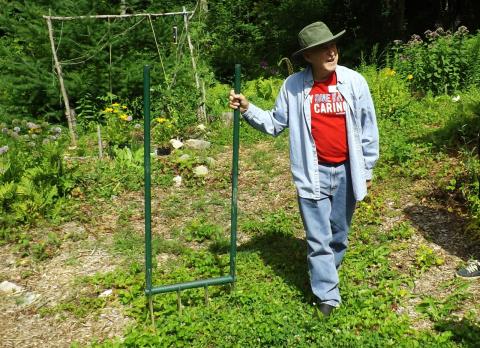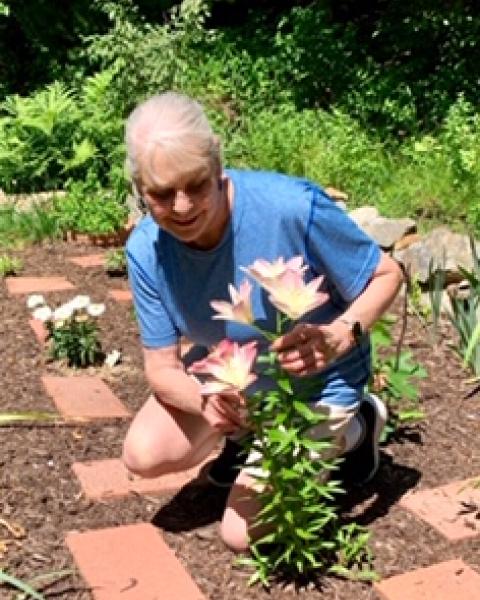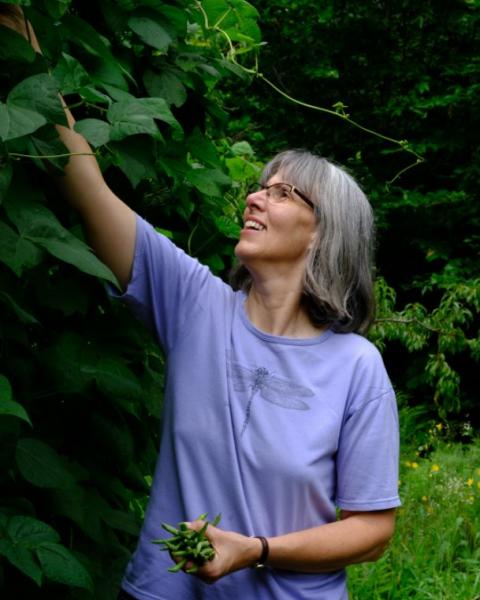Bob Richer: Teaching Gardening at the Eco-Learning Collaborative

One thing Bob Richer wants to stress is that he has always been a teacher. He worked as a teacher for 37 years, and now retired, is a 10-year Master Gardener volunteer teaching others how to garden at the Eco-Learning Collaborative Gardens in Plymouth and at his Groton home garden.
The Eco-Learning Collaborative (E-LC) garden, sponsored by Granite United Way, is at the Whole Village Family Resource Center. The center’s purpose is to “strengthen families while building a community that supports the healthy development of all children in the community.” That goal includes maintaining a 2,900-square foot mandala garden - a raised-bed, permaculture-inspired garden. “There are rows upon rows in each bed.”
Bob got his Master Garden credentials in late 2008, and since then has volunteered in the E-LC garden. Garden produce goes to local food-related, social programs feeding some of the 7,000 residents in the Plymouth area. “I was drawn to the [master gardener] program by my passion for gardening and my background in education,” says the former 37-year U.S. Army employee. He initially was a Vietnam War Era officer, and later a civilian organizational psychologist, teaching management principles to soldiers and civilians. Bob received a doctorate from The George Washington University in 2003, before retiring in 2006. “I've always defined myself as a teacher, in or out of the Army,” he says.
Of his childhood growing up in Rhode Island, Bob says that the family ate well. “Dad always had a large garden,” and “Pépère [grandfather] had pigs. We dug a lot of clams” and fished from lakes and the Atlantic Ocean.
After retiring, Bob “knew it was time to give back” and pay forward the riches that occurred in his life. He and his wife of 51 years, Céline — “the love of my life” — bought a three-acre property in Groton “after living in Baltimore area more than 30 years. Groton is beautiful, quiet and folks are friendly.”
Bob, 73, has taught permaculture concepts at two Master Gardener classes in Littleton and also uses his garden as a teaching space. “My garden is a permaculture forest garden where each plant has many functions,” he says. For instance, he has planted “many perennial nuts, berries, grapes, rhubarb, fruit trees, medicinal plants to fit in guilds,” which is a group of plants, animals and insects that function with each other for best results. He also uses hugelkultur, planting in organic material piled on mounds of wood which helps plants survive droughts.
The E-LC tract is “a typical mandala garden, but huge,” says Bob, “and I do not do this alone.” He credits Master Gardeners Joan Pushee, Louise Migliore, Deanna Lussier and Dick Flanders who “teach and tend with me.” He also meets with Lisa Ford, Extension’s Nutrition Connection teacher. The E-LC garden recently added “cattle panels,” says Bob, a type of fencing constructed that adds vertical space to grow vine plants, such as beans.
Whole Village recently added a building to shelter homeless veterans. No one is living there yet, but Bob already has future plans. “I hope to be teaching gardening to those vets one day.”
UNH Cooperative Extension Master Gardener volunteers share information about home, yard, and garden topics with the people of New Hampshire. Got questions? Master Gardeners provide practical help finding answers to your questions through the Ask UNH Extension Infoline. Call toll free at 1-877-398-4769, Monday to Friday, 9 a.m. to 2 p.m., or e-mail us at answers@unh.edu.

